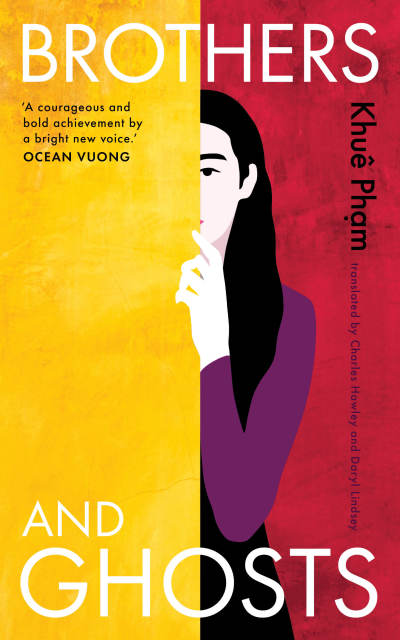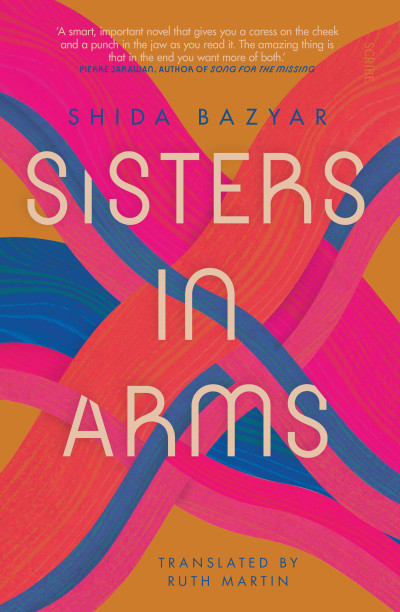‘Lizzie Burns’ voice is pitch perfect. She is a magnificent creation, worthy of comparison to Joyce's Molly Bloom or Beckett's Winnie — her voice spills beyond the pages of the book, endless, vital, witty and enduring.’
Rebecca Stott, author of Ghostwalk
‘Gavin McCrea’s witty, fictional interpretation of the women who loved Engels crackles and fizzes with life. Lizzie Burns and her sister Mary are the dark heart of a book which manages to reconfigure a key period in British history while also showing us the flawed, human side of a great thinker. Lizzie's narration is wonderfully yet lightly stylised, and this is an excellent debut.’
Francesca Rhydderch, author of The Rice Paper Diaries
‘This whirlwind of politics and personalities might become dizzying were it not stabilised by Lizzie’s unmistakable voice. She begins life by grabbing what she needs in order to survive; she ends it having achieved deep self-knowledge. She tells her own story with a fierce wit and trenchancy, shot through with poetry … McCrea’s fictional speculation makes a fine symphony out of the silence that surrounds Lizzie Burns.’
Helen Dunmore, The Guardian
‘In Mrs Engels, Lizzie Burns, an Irish-woman from Manchester, narrates the story in her own, deliberately non-modern idiom … Lizzie provides an irreverent working-class take on all the intellectual posturing going on … Gavin McCrea is triumphant in his exuberant debut in creating Lizzie’s voice; she is dazzlingly convincing. Voices that feel authentic to their period and yet brim with life and verve are so rare that Mrs Engels is my book of the month.’
Antonia Senior, The Times
‘[Gavin McCrea] deserves praise for his command of voice in Mrs Engels… This is the best kind of historical fiction — oozing period detail, set in a milieu populated by famous figures and events about which much is known, but seen through the eyes of a central character who, due to her illiteracy, left no ready access to her experience in the form of letters or diary entries: a rich and accomplished first novel.’
Lucy Scholes, The Independent
‘Ambitious and imaginative … McCrea breathes real life into a historical character of whom we know next to nothing.’
Nigel Jones, Daily Mail
‘An assured, beautifully-written debut, about a woman wiser than her lover perhaps, and slowly growing into herself — reminiscent of Molly Bloom in Ulysses. Eleanor Marx wrote that Lizzie was “illiterate and could not read or write, but she was true, honest and in some ways as fine-souled a woman as you could meet”. Going by this, McCrea describes her perfectly.’
Mario Reading, The Spectator
‘Unusual in its focus, and broad in its reach, Mrs Engels does that thing that good historical novels should do: it allows you to see a piece of the past that you have never seen before, and open your eyes to a story that has not yet been told.’
Walter Scott Prize for Historical Fiction 2016 judging panel
'McCrea has cleverly included just enough historical detail to set a very evocative scene, then lets his cast tell the story. The writing always surprises, his characters are compelling without having to be likeable and, as all of we judges noted, Mrs Engels is perhaps the most feminist novel we read for the Prize.’
Iain Pears, chair of judges for the Desmond Elliott Prize
‘[Lizzie Burns's] plain, provocative, wittily realistic voice rings truthfully throughout this novel of ideas and ideals. She gives heartfelt, humanising context to the revolutionary politics and principles of Marx, Engels and their conflicted struggles to live morally virtuous lives in late Victorian England. Fiercely but tenderly fighting for heart over mind, Lizzie is one of the most distinctive female characters of modern fiction.’
Iain Finlayson, Saga
‘Richly imagined … McCrea gives the illiterate Lizzie [Burns] a vivid, convincing voice, sparkling with energy and not untouched by pathos. Her sharp, pragmatic observations offer a human perspective on historical icons. But the heart of the novel is the beautifully realized romance between Lizzie and Frederick: a mismatch of values and temperaments, yet also a tender and complex bond.’ STARRED REVIEW
Publishers Weekly
‘The fictional Lizzie Burns is a marvellous creation: an illiterate Irish daughter of the Manchester slums whose withering deprecations cut a swathe through the self-delusions and hypocrisies of the founding fathers of Communism … Laugh-out-loud funny, touching and tender, and almost Dickensian in its physical descriptions of the Industrial Revolution's worst excesses, Mrs Engels is a stunningly accomplished debut novel.’
Declan Burke, Irish Examiner
‘Superb … A splendid exploration of the complexities of love and the contradictions between political ideals and intractable personal realities.’
Joseph O’Neill, Irish Times
‘Extraordinarily assured … Lizzie is an ever-intriguing, rounded character.’
Sunday Herald
‘Mrs Engels is a profound achievement, sophisticated and tense in each element of its construction and expression … It is a compelling [work] of remarkable subtlety and insight, a novel which illuminates the power, limitations and gaps in our stories of the past.’
Ron Callan, Irish Times
‘A stellar debut … Lizzie’s voice — earthy, affectionate, and street-smart but also sly, unabashedly mercenary, and sometimes-scheming — grabs the reader from the first sentence and doesn't let go … Who knew reading about communists could be so much fun.’ STARRED REVIEW
Kirkus Reviews
‘A tour de force … Lizzie provides a bubble-busting, prole’s-eye view of the movers and shakers of socialist theory … It is nothing short of a phenomenon that a youngish male author has managed to inhabit the heart and soul of a middle-aged Victorian Irishwoman, bringing her and her milieu vibrantly alive — and in his debut novel, too.’
New Books
‘Lizzie’s distinctive working-class Irish spin on the foibles of upper-crust London society is at once biting and humorous, and Dublin-born world traveler McCrea is a new author to follow for those who enjoy potential Man Booker Prize longlisters. It is a pity that the full biography of the Burns sisters may never be told in nonfiction, yet readers will feel that McCrea has done them justice here.’
Library Journal
‘[M]asterly and original, examining through the eyes of the brave, noisy and clever yet illiterate Lizzie the work and friendship of Marx and Engels and the lives of women.’
Kerryn Goldsworthy, The Age
‘The best first novel I read this year.’
Alan Massie, The Scotsman
‘You can’t keep a good woman down — not even one … whose humble background raises eyebrows and hackles in her elite new social circles … Lizzie Burns, the former mill worker who was Friedrich Engels’s real-life lover, speaks her sassy mind in Gavin McCrea’s debut novel, Mrs. Engels.’
MORE Magazine
‘Mrs. Engels explores the subtleties of a historic movement through the vantage of Lizzie Burns, Frederick Engels’ longtime companion and eventual wife … Her position allows the story’s perspective to refreshingly shift from observing Engels and Marx’s work life and ideals to registering the domestic decorum and politics that have shaped Lizzie’s life. As Frederick imagines what could be, resenting the illusory social norms that dictate what is, Lizzie, to survive, must occupy herself with the very reality he and his peers frequently abhor or ignore.’
ZYZZYVA Magazine
‘This debut novel is told in the voice of Lizzie Burns, Communist Manifesto co-author Friedrich Engels’s longtime lover. The illiterate Lizzie left no records so McCrea has had to imagine her into existence – which he has done impressively.’
The National Book Review
‘Enormously rich and complex … Lizzie’s voice is tremendously well handled and Victorian London, as described through her wry eyes, explodes on the page.
BookBrowse
‘The illiterate lover and eventual wife of a coauthor of The Communist Manifesto is the star of this enthralling work of historical fiction.’
O, The Oprah Magazine
‘An impressive debut … Mr. McCrea draws sharp ironies from the gap between theory and actuality … A memorable portrait of a woman looking for a cause of her own, distinct from the one made famous by her husband.’
Wall Street Journal
‘A powerhouse protagonist, Lizzie Burns … is as improbable a subject for historical fiction as she is irresistible. Invoking the prickly lyricism of an Irish prole who may have missed her literary calling (“weeping” becomes “laying on liberal with the sniff and blubber”), McCrea portrays Lizzie as a deceptively hard-boiled pragmatist with an arriviste’s sensitivity to the uses of money.’
Jan Stuart, The New York Times Book Review
‘Lizzie Burns has been brought to life with exuberant force by the first-time author Gavin McCrea … She’s shrewd, but having come from the slums, she finds managing household servants rather awkward, and she’s ambivalent about life with the rich, powerful man who has made of Marx “something like a wife.”’
Carmel Ciurato, The New York Times





















